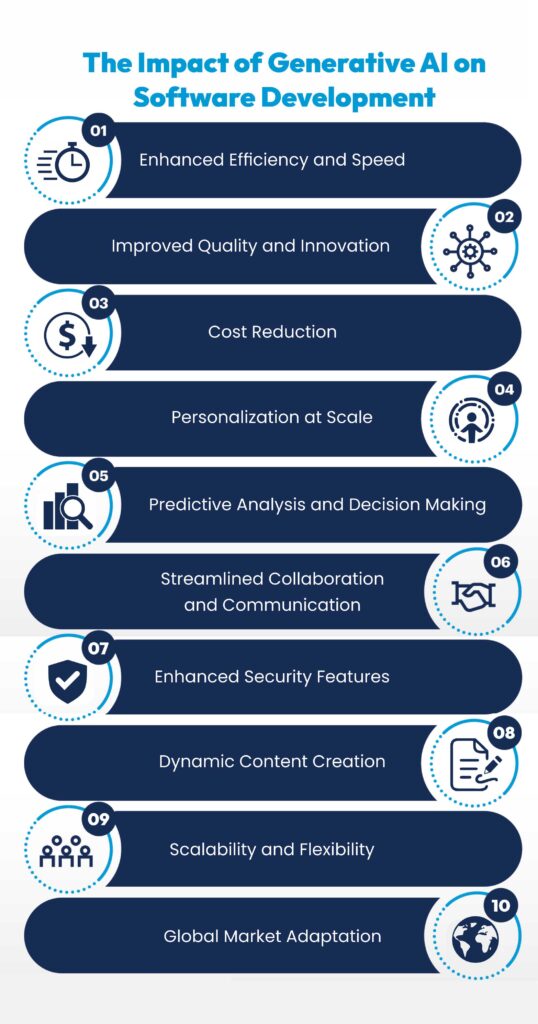
The world of software development is constantly evolving, and one of the most exciting frontiers is the emergence of Generative AI. This powerful technology has the potential to revolutionize the way we build software, impacting everything from design and development to testing and deployment.
For businesses ready to explore the dynamic world of software development, the advent of Generative AI offers unparalleled opportunities for innovation and growth. By integrating this cutting-edge technology into their development processes, companies can significantly enhance their efficiency, reduce time-to-market, and deliver superior software products that stand out in the competitive digital landscape.
According to a McKinsey report, the Generative AI market size is expected to reach $4.4 trillion by 2031, indicating not just a trend but a seismic shift in the technological and business landscape. The increasing market share can be attributed to the technology’s versatility, AI tools growth, and capacity to drive significant improvements across various sectors.
According to data from precedenceresearch.com, by end-use, the business and financial services segment is expected to grow at the fastest rate of 36.4% from 2023 to 2032. This highlights the increasing adoption and significance of generative AI in transforming operations within the business and financial sectors, further underlining its pivotal role in reshaping various industries.

This blog will dive into the transformative role of Generative AI in software development, illustrating its capacity to revolutionize standard practices and drive growth for businesses entering this innovative field.
So, without further ado, let’s dive right into the details.
Understanding the impact of generative AI on software development
Generative AI is revolutionizing the software development services landscape, providing businesses with unparalleled opportunities for innovation, operational efficiency, and the creation of cutting-edge applications. Its impact is far-reaching, influencing every stage of software development, from design to deployment. Let’s discover how Generative AI is transforming the field and why businesses should pay attention:

1. Enhanced efficiency and speed
Leveraging Generative AI development services helps businesses automate repetitive coding tasks, generating high-quality code at an unparalleled pace. This includes generating code for bug fixes, new features, and even automated testing, significantly reducing development time. This translates to faster time-to-market for businesses, crucial for staying ahead in competitive industries.
2. Improved quality and innovation
By freeing developers from regular coding tasks, Generative AI empowers them to focus on strategic problem-solving and creative exploration. This elevates the overall quality of applications and fosters a culture of innovation, leading to more differentiated and impactful products. Businesses can leverage this to cater to specific customer needs and gain a competitive edge.
3. Cost reduction
Generative AI’s automation capabilities significantly reduce the need for manual coding efforts, leading to substantial cost savings in software development. This cost efficiency empowers businesses, especially startups and small-to-medium enterprises, to allocate resources more effectively, investing in critical areas like marketing or customer service.
4. Personalization at scale
Generative AI can analyze user data and behavior patterns to create highly personalized user experiences within applications. This level of customization is key for businesses looking to improve user engagement and satisfaction. By tailoring experiences to individual needs, businesses can attract and retain users, directly impacting the application’s success.
5. Predictive analysis and decision making
Generative AI’s ability to process and analyze vast amounts of data allows it to predict trends, user needs, and potential market shifts. This predictive power equips businesses with invaluable insights to make informed decisions, enabling them to anticipate market demands and adapt their applications accordingly.
6. Streamlined collaboration and communication
Manual documentation and progress reports can create communication roadblocks within development teams. Generative AI automates these tasks, generating clear and concise documents and summaries. This fosters smoother information flow and shared understanding, leading to more streamlined project management and efficient collaboration.
7. Enhanced security features
Traditional methods of identifying security vulnerabilities in code can be time-consuming and error-prone. Generative AI analyzes code with greater depth and precision, pinpointing potential security risks early in the development cycle. This proactive approach allows businesses to strengthen application security, builds user trust, and protects against costly breaches.
8. Dynamic content creation
Static content can quickly become disengaging for users. Generative AI excels at creating dynamic content like personalized recommendations or interactive elements within applications. This keeps content fresh and engaging, driving user interest and fostering repeat visits.
9. Scalability and flexibility
Building applications with traditional methods often create inflexible systems that struggle to adapt to changing needs. Generative AI empowers businesses to develop software that is inherently scalable and adaptable. This allows them to grow and expand their offerings without being hindered by software limitations.
10. Global market adaptation
Entering new international markets often requires significant customization of features, language, and content. Generative AI simplifies this process, enabling businesses to tailor their applications to diverse cultural and regulatory requirements. This unlocks new growth opportunities and helps reach wider audiences across the globe.
Summing up
Generative AI is not only a technological advancement but also a paradigm shift that is reshaping the software development landscape. By enhancing efficiency, fostering innovation, and creating more secure and personalized applications, this technology is setting a new standard for businesses in software development. As we progress, integrating Generative AI into development processes is becoming less optional and more necessary for companies aiming to thrive in the digital age.
